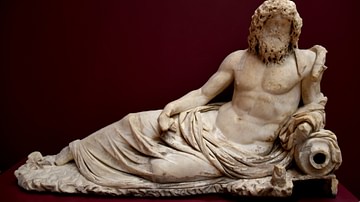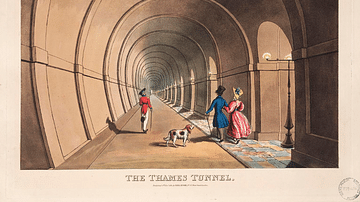Search Definitions
Browse Content (p. 57)

Definition
Josiah Wedgwood
Josiah Wedgwood (1730-1795) was an English manufacturer and inventor who designed and created pottery of all kinds. Noted for his jasper stoneware, Wedgwood was also innovative in how he set up his factory works, for embracing new technology...

Definition
Oceanus
Oceanus (also Okeanos) was the eldest of the Titans and a son of Uranus (Heaven) and Gaia (Earth) in Greek mythology. He was the god and personification of the freshwater river Oceanus, which was thought to encircle the earth and was said...

Definition
Homo Habilis
Homo habilis ("handy man") is an extinct species of human that lived in East and South Africa between 2.3 and 1.5 million years ago and plays an interesting role in the discussion surrounding the dawn of our genus of Homo, which is thought...

Definition
Dagobert I
Dagobert I (l. 605-639) ruled as King of Austrasia from 623 to 634 and as King of All the Franks from 629 to 639. Together with the reign of his father, Chlothar II, the period of Dagobert's rule has been characterized as the peak of Merovingian...

Definition
Thames Tunnel
The Thames Tunnel was completed in 1843 and connects the two banks of the River Thames at Rotherhithe and Wapping in London. The 20-year project was masterminded by Marc Isambard Brunel (1769-1849) and was both the first tunnel to be built...

Definition
Narcissus
Narcissus is a figure from Greek mythology who was so impossibly handsome that he fell in love with his own image reflected in a pool of water. Even the lovely nymph Echo could not tempt him from his self-absorption. Narcissus' name lives...

Definition
Chlothar II
Chlothar II was a Merovingian king of the Franks, who reigned from 584 to 629. He inherited the throne of Neustria as an infant, upon the assassination of his father, Chilperic I (r. 561-584). Following a long and bitter power struggle with...

Definition
Luddite
The Luddites, named after their legendary leader Ned Ludd, were workers who protested at the mechanization of the textile industry during the Industrial Revolution. From 1811 to 1816, the violent strategy of the Luddites was to smash the...

Definition
Samuel
Samuel is a character in the Hebrew Bible and the Old Testament, uniquely depicted as having served several roles, as judge, military leader, seer, prophet, kingmaker, priestly official, and loyal servant of Yahweh. He is traditionally thought...

Definition
Hesperides
The Hesperides are nymph-goddesses of the evening and the west in Greek mythology. They were the daughters of Atlas, the Titan who bore the heavens on his shoulders, and Hesperis, the personification of the west, or Nyx, the personification...